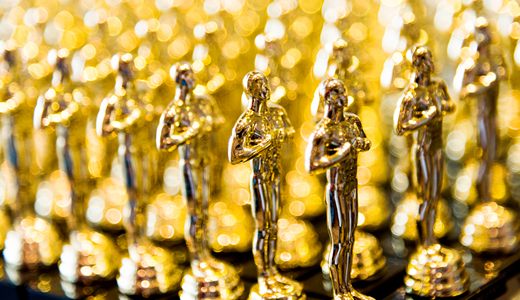Hollywood measures success in two ways: One, the amount of money it rakes in; and two, the number of Oscars its movies take home. And while 2018’s biggest financial winners have long been in the books (hint: pretty much everything that has a Stan Lee cameo in it would qualify), we’re a step closer to knowing what the entertainment industry considers art.
Yes, that’s right. The Academy of Motion Picture Arts and Sciences unveiled its annual roster of Oscar nominees yesterday morning, and in some respects, things went according to plan. The Favourite proved true to its name, collecting a tidy 10 nominations, including one for Best Picture and three for its three main players (Olivia Colman for Best Actress, Rachel Weisz and Emma Stone for Best Supporting Actress). A Star Is Born didn’t clean up as much as some expected (no nod for Bradley Cooper as Best Director, for instance), but it still banked eight noms. As expected, Black Panther became the first superhero film to ever be nominated for Best Picture. All told it gathered in seven nominations with its retractable claws.
Then, of course, we must talk about the success of Roma. And while its success was expected, it certainly shows how the film industry is changing.
For years, Netflix has been pounding at Oscar’s door, demanding admittance. For years, Oscar’s barred its entry, largely shunning Best Picture hopefuls such as Beasts of No Nation and Mudbound. This year, Netflix changed its release strategy (giving some of its most promising award-bait flicks traditional in-theaters releases); joined the MPAA; and released an extraordinarily artsy, deeply personal film from Gravity director Alfonso Cuarón. Oscar acknowledged it in a big way, showering a Favourite-tying 10 nominations on the black-and-white drama. Another Netflix flick, The Ballad of Buster Scruggs, earned three noms. Times, they are a-changing.
Also surprising: The Academy’s collective love for both the Freddy Mercury biopic Bohemian Rhapsody and the scorching political screed Vice. Critics greeted both with a collective meh: Bohemian Rhapsody sits with a 62% “freshness” rating on Rotten Tomatoes, with Vice barely better at 64%. (For comparison’s sake, Paddington 2 and the criminally overlooked Leave No Trace both snagged a perfect 100% freshness rating on the site.) No matter: Both Bohemian and Vice collected Best Picture nominations, and Vice earned a whopping eight nominations total. Perhaps Vox’s summation of Vice’s success is telling: “Say what you will about the Oscars: They enjoy self-congratulatory liberal agitprop!”
And that reflects, perhaps, a wider message that the Oscars sent to moviegoers: Socio-political messages are perhaps the most surefire path to Oscar glory. Writing for Variety, Owen Glieberman says that the (relative) failure of A Star Is Born and the success of movies such as Vice, BlacKkKlansman (which earned a Best Picture nomination) and even Black Panther offer evidence of Hollywood’s desire to not just teach, but preach. “The Message of the Oscar Nominations: You’d Better Have a Social Message,” proclaims his headline.
(But setting aside whatever agendas Hollywood may have in its nominations, we should also note that this year’s crop of Best Picture nominees was as populist as it’s been in years. Three of them—Black Panther, A Star Is Born and Bohemian Rhapsody—earned more than $200 million at the box office.)
Who will set the table to hand out all these awards? Who knows? The Oscar telecast still doesn’t have a host, and some are A-OK with that.
Perhaps they could check in with Facebook, which knows lots about each and every one of us and might have a good idea who’d be a fun Oscar host. That said, some folks have sounded an alarm over the “10 Year Challenge” cruising around the network these days, which may allow Facebook and other parties to mine personal data. “It presented Facebook with a terrified opportunity to learn, to train their systems to better recognize small changes” in users’ faces, New York University professor Amy Webb told CBS News. (Facebook has since distanced itself from the challenge.)
But back to Netflix, because let’s be honest: It’s hard to get away from it. It completely upended the television industry. It’s making huge inroads in the movie biz. It’s the way more than a few of you spend most of your evenings. But this entertainment giant does have a huge-and-growing rival: Fortnite. And don’t blame it on just those playing the game. Blame those who watch people play the game.
“We compete with (and lose to) Fortnite more than HBO,” Netflix admitted to its shareholders in a recent letter. “there are thousands of competitors in this highly fragmented market vying to entertain consumers.” Given that increased competition, it’s probably no surprise that the streaming company also announced that it’s raising its prices, even as competitor Hulu lowers its subscription cost.(Oh, and the service is prepping for more competition in the “traditional” streaming space quite soon, too. And personally, I’ll be more interested to watch this titanic battle royale over the coming months than a Fortnite match.)
Finally, let’s close this edition of Culture Clips with another look at some awards, shall we? Right after the Oscars unveils its picks for the best movies of the year, the Razzies roll out what it thinks are the worst. Among the leading contenders: Holmes & Watson, Winchester, The Happytime Murders and Gotti, a John Travolta travesty apparently so bad that Plugged In didn’t even review it.
Trust me: Given the number of bad movies I saw last year, that’s saying something.






Recent Comments